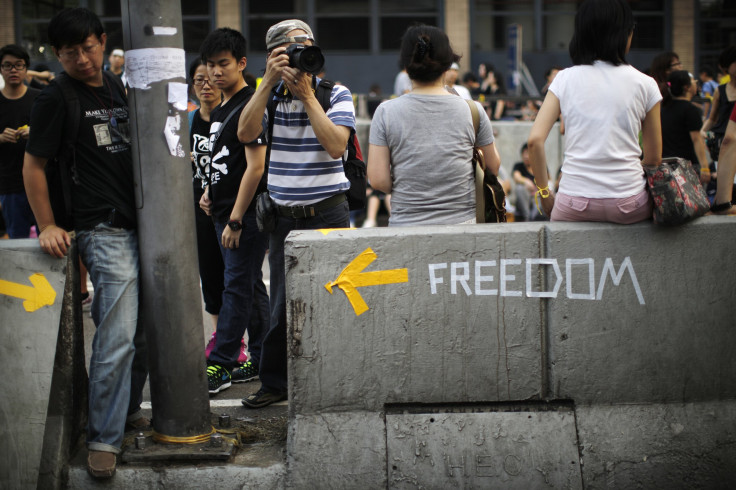Hong Kong Tourists Shopping For iPhone 6 Find Uncensored View Of Occupy Central Protests

China’s great wall of censorship has kept most of the population in the dark about what’s going on in Hong Kong, but visitors from the mainland have had a full view of the protests. Mainland tourists frequently cross the border to shop in Hong Kong, and, along with a chance to buy an iPhone 6 or Louis Vuitton purse, are being exposed to a wholly uncensored pro-democracy movement.
Hong Kong, which enjoys greater freedom than mainland China, has been a popular tourist destination for the more than 1 billion Chinese unable to buy Western consumer goods at home. The iPhone 6 has been the most recent point of attraction for mainland Chinese who are too impatient for the product to be released on their side of the border. The availability disparity has created a thriving black market in Beijing, where smuggled iPhones are reportedly commanding $2,400.
Visitors from the mainland since the Occupy Central protests began on Sept. 27 have complained that the demonstrations have affected their trip, though. Protest leaders intentionally planned the mass gatherings at the Tsim Sha Tsui district in Kowloon, a popular district where stores like Prada, Dolce & Gabana and others are located so tourists would witness what’s going on.
“I don’t have an opinion about the politics of this,” Zhou Peng, a businessman from the southwestern Chinese city of Chengdu, told the New York Times while taking pictures of the protests in the shopping district. “I came here over the holiday with my kid to see Hong Kong, but we can’t do that. This affects our trip.”
While a number of mainlanders have joined the protests, some of the frustration tourists have experienced is mutual. Hong Kong natives have complained that the number of visitors has contributed to steep real estate prices, with luxury department stores eliminating local business and making life difficult for residents who struggle to afford rent.
But the location is no accident. Much of the mainland’s 1.36 billion strong population has little notion of the discourse taking place in the southern city.
If Hong Kong activists forgot about how heavily Beijing restricts the flow of information into China they were reminded by reports indicating photos of the protests on WeChat were censored when sent to their Chinese contacts. Beijing, in an attempt to restrict what little knowledge there is, began suspending travel visas to Hong Kong Wednesday.
“The most important reason for coming here is there are a lot of tourists, a lot of luxury stores and people from mainland China,” activist Frankie Chan told the Times. “The only have limited sources of information. We are not stopping their shopping. We want to draw their attention to what Hong Kong is fighting for.”
© Copyright IBTimes 2025. All rights reserved.



















